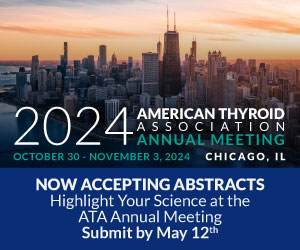October 16, 2013 — Anaplastic thyroid carcinomas (ATC) are aggressive tumors that do not respond to traditional radio- or chemotherapeutic agents, and there currently is no cure or effective treatment available. Median survival from diagnosis is 5 months, and although ATC accounts for only 1.7% of all thyroid cancers in the U.S., it is responsible for a large proportion of thyroid cancer-related deaths. A novel drug target, and evidence of the strong anti-tumor effects of an inhibitor capable of blocking expression of the target are described in a poster to be presented at the 83rd Annual Meeting of the American Thyroid Association, October 16-20, 2013, in San Juan, Puerto Rico.
Christina von Roemeling and colleagues from The Mayo Clinic, Jacksonville, FL, found that the enzyme stearoyl-CoA desaturase 1 (SCD1), which has a role in fatty acid metabolism, is expressed at high levels in tissue samples from patients with papillary thyroid carcinoma (PTC), high grade follicular thyroid carcinoma (FTC), and ATC. An inhibitor of SCD1 expression demonstrated strong anti-tumor activity–reduced tumor cell proliferation and increased cell death–specifically in ATC cells and showed little to no activity in PTC or FTC cells. The sequential addition of a proteasome inhibitor led to a synergistic effect and enhanced anti-tumor activity in ATC cells. The researchers propose the combined use of an SCD1 inhibitor and a proteasome inhibitor as a new treatment regimen that might benefit patients with ATC.
“Since anaplastic thyroid cancer is one of the most aggressive and least treatable of all cancers, new therapies are desperately needed,” says Ronald J. Koenig, M.D., Ph.D, Program Committee Co-Chair, and Professor, Department of Internal Medicine, University of Michigan Medical Center, Ann Arbor. “The study by von Roemeling and colleagues is important because they show that drugs that inhibit the enzyme SCD1 can kill anaplastic thyroid cancer cells in a culture dish. This exciting finding will need to be tested in animal models of anaplastic thyroid cancer before consideration of clinical trials, but it offers hope for a disease very much in need of new therapies.”
About the ATA
The American Thyroid Association (ATA) is the leading worldwide organization dedicated to the advancement, understanding, prevention, diagnosis and treatment of thyroid disorders and thyroid cancer. ATA is an international individual membership organization with over 1,700 members from 43 countries around the world. Celebrating its 90th anniversary, ATA delivers its mission through several key endeavors: the publication of highly regarded monthly journals, THYROID, Clinical Thyroidology (CT), VideoEndocrinology and CT for Patients; annual scientific meetings; biennial clinical and research symposia; research grant programs for young investigators, support of online professional, public and patient educational programs through www.thyroid.org; and the development of guidelines for clinical management of thyroid disease. Visit www.thyroid.org for more information.
Media Contact
Bobbi Smith
Executive Director of the American Thyroid Association
Email: thyroid@thyroid.org



